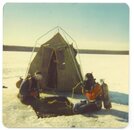skippyscuba
Registered
Hi,
I have a really quick question regarding ice diving. Does the term 'Ice diving' typically refer to diving under a sheet of ice, or does it cover any diving where there is ice involved?
Thanks
I have a really quick question regarding ice diving. Does the term 'Ice diving' typically refer to diving under a sheet of ice, or does it cover any diving where there is ice involved?
Thanks





